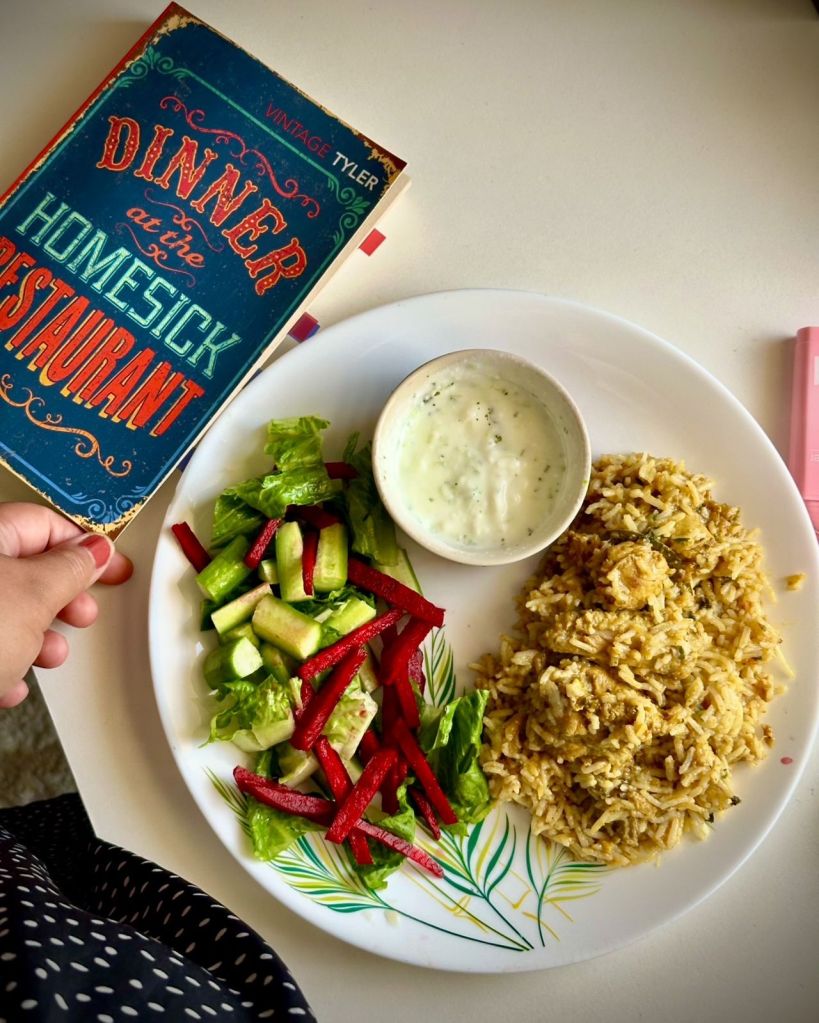
Anne Tyler’s “Dinner at the Homesick Restaurant” is a culinary journey through the highs and lows of family life, served with a side of dry humor and a dollop of poignant insight. Like a meticulously prepared meal, Tyler’s novel offers layers of flavors that simultaneously delight and challenge the palate. At its core, the book explores the lives of the Tull family, dissecting their intricate relationships with a sharp, yet compassionate, knife.
The story is centered around Pearl Tull, a matriarch whose iron will and sharp tongue often clash with her soft spot for her children. Pearl is a character who can be as nurturing as a warm bowl of soup or as biting as a chili pepper. As she tries to hold her family together after being abandoned by her husband Beck, we see the consequences of her tough love on her three children: Cody, Ezra, and Jenny.

Pearl’s resolute nature is encapsulated in her words: “Fate had scooped her up and flung her into this life, and it had left her to sink or swim.” With this, Tyler sets the tone for a life of resilience masked by a stern exterior. Pearl’s determination is both admirable and maddening, as she imposes her will on her children in ways that leave lasting scars.
Cody, the eldest, is a simmering pot of resentment and ambition. His relentless competition with his brother Ezra flavors much of his narrative. Cody’s pursuit of success and his obsessive rivalry are summarized in his biting remark: “I’m going to beat you, Ezra. I’m going to beat you at everything you ever tried to do.” Cody’s journey is one of perpetual dissatisfaction, constantly trying to fill the void left by his father’s departure and his mother’s high expectations.
Ezra, on the other hand, is the peacemaker, the chef at the heart of the titular Homesick Restaurant. His dream of creating a place where people feel at home is a metaphor for his desire to mend his fractured family. His gentle nature and culinary skills make him a comforting presence, contrasting sharply with Cody’s aggression. Ezra’s philosophy is poignantly captured in his belief: “People always want to go back to the place where they felt most comfortable in the world.” This sentiment is at the heart of Ezra’s character and his efforts to create a haven for his family, even as they resist his efforts.
Jenny, the youngest, navigates her way through the family chaos with a mix of resilience and vulnerability. Her profession as a pediatrician and her multiple marriages reflect her quest for stability and love. Jenny’s reflections on her family are both humorous and sad, as seen in her remark: “We were like a disease. We infected our children.” This darkly comic observation underscores the generational cycle of dysfunction that the Tulls seem unable to escape.
The narrative structure of “Dinner at the Homesick Restaurant” is a masterful blend of shifting perspectives and timelines, allowing readers to experience the same events from multiple viewpoints. This technique enhances the richness of the characters and their relationships. Tyler’s writing is both lyrical and incisive, capturing the complexities of family life with a light touch and profound understanding.

One of the most memorable scenes in the novel is the recurring attempt at a family dinner at Ezra’s restaurant. Each dinner ends in chaos, symbolizing the Tull family’s inability to achieve harmony. Pearl’s reflection during one of these dinners, “We don’t know one another. We are strangers living under the same roof,” captures the essence of their struggle. Despite their best efforts, the Tulls are perpetually out of sync, their lives marred by misunderstandings and unspoken grievances.
Tyler’s humor shines through in her depiction of these family gatherings. The absurdity of their attempts at unity, only to end in disaster, is both tragic and comical. The Tulls’ interactions are reminiscent of a dark comedy where every punchline is laced with a hint of sorrow. This blend of humor and pathos is what makes Tyler’s writing so engaging and relatable.
The theme of memory and its unreliable nature is another thread woven through the narrative. Each character’s recollection of past events differs, highlighting the subjective nature of memory. This is poignantly illustrated in the scene where Pearl, reflecting on her life, thinks, “Memory is a snare, pure and simple; it alters, it subtly rearranges the past to fit the present.” This line encapsulates the way the Tulls’ memories are colored by their current emotions and perspectives, adding depth to their interactions.
Tyler’s characters are not just products of their upbringing but also individuals struggling to break free from the molds cast by their past. The siblings’ attempts to carve out their own identities while dealing with the legacy of their parents’ failures form the crux of the novel. Cody’s constant need to prove himself, Ezra’s quest for peace, and Jenny’s search for love are all responses to the same familial pressures, yet they manifest in unique ways.
The novel’s conclusion, much like a well-crafted meal, leaves readers with a lingering taste that is both satisfying and thought-provoking. As Pearl nears the end of her life, her children come together one last time. The final dinner, unlike the chaotic gatherings of the past, is a subdued and reflective affair. Pearl’s death acts as a catalyst for the siblings to finally confront their shared history and the wounds they carry. In her passing, Pearl inadvertently brings her children closer, achieving in death what she could not in life.
Ezra’s final act of closing the Homesick Restaurant symbolizes a new beginning for the Tulls. It is a bittersweet moment, marking the end of an era and the start of a new chapter. Ezra’s reflection, “Sometimes you simply needed to find the place where you could start over,” encapsulates the novel’s message of hope and renewal. The Tulls may never fully escape their past, but they can learn to live with it and, perhaps, find a measure of peace.
In “Dinner at the Homesick Restaurant,” Anne Tyler serves a literary feast that is rich in flavor and texture. Her keen observations and witty prose elevate the mundane details of family life into a profound exploration of human relationships. The novel’s blend of humor and pathos, its complex characters, and its insightful commentary on memory and identity make it a timeless and compelling read.
As you turn the last page, you’ll find yourself ruminating on Tyler’s words, much like savoring the aftertaste of a finely prepared meal. Her portrayal of the Tull family is a reminder that, despite the messiness and imperfections of life, there is beauty in the shared experience of being human. And that, perhaps, is the true essence of home.
Check out the book here
Thank you for reading. For regular bookish updates, follow my Bookstagram account: @food_and_book_nook
